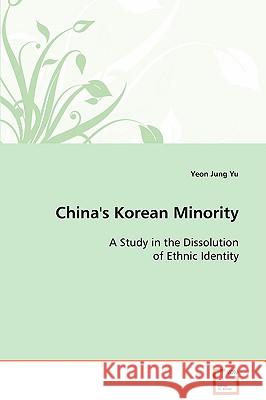China's Korean Minority » książka
China's Korean Minority
ISBN-13: 9783639050578 / Angielski / Miękka / 2008 / 72 str.
Until the early 90s, Chinese Koreans maintained their Korean culture, language, traditions, and lineage based on kinship relations. Contrary to many scholars' predictions that the growing interaction with South Koreans would help Korean ethnics develop a minority community in China while preserving their own language and culture, Yu's research reveals that a crisis of dissolution has developed among Chinese Koreans and that the Korean minority in China is assimilating to Chinese society ever more rapidly. This book focuses on how Chinese economic reforms and interaction with South Koreans have brought change to the Korean ethnic minority in China's northeast and helped to affirm the Korean ethnic minority's identity as Chinese Koreans. Social scientists or anyone interested in studies on China or East Asia, ethnic minority studies, cultural and linguistic preservation, migration, or political economy will find this study useful.
Until the early 90s, Chinese Koreans maintained their Korean culture, language, traditions, and lineage based on kinship relations. Contrary to many scholars predictions that the growing interaction with South Koreans would help Korean ethnics develop a minority community in China while preserving their own language and culture, Yus research reveals that a crisis of dissolution has developed among Chinese Koreans and that the Korean minority in China is assimilating to Chinese society ever more rapidly. This book focuses on how Chinese economic reforms and interaction with South Koreans have brought change to the Korean ethnic minority in Chinas northeast and helped to affirm the Korean ethnic minority’s identity as Chinese Koreans. Social scientists or anyone interested in studies on China or East Asia, ethnic minority studies, cultural and linguistic preservation, migration, or political economy will find this study useful.











